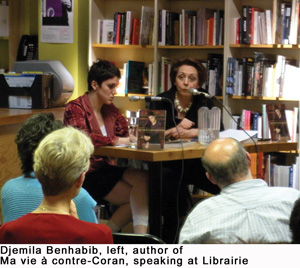A Syrian national is warning fellow Canadians to stand up for secular values and not make unreasonable accommodations for Islamists.
 Djemila Benhabib, author of Ma vie à contre-Coran, spoke to a group of roughly 50 last week at a Côte des Neiges bookstore. Describing herself as an ordinary woman having experienced extraordinary hardships, she told the audience of her family’s persecution in Syria and the constant threats that came from religious fanatics that forced them to leave the country in the early 1990s. The title of her book refers to the battle she fought as a child and teenager against Islamist indoctrination in her homeland and the threat it now poses to the West.
Djemila Benhabib, author of Ma vie à contre-Coran, spoke to a group of roughly 50 last week at a Côte des Neiges bookstore. Describing herself as an ordinary woman having experienced extraordinary hardships, she told the audience of her family’s persecution in Syria and the constant threats that came from religious fanatics that forced them to leave the country in the early 1990s. The title of her book refers to the battle she fought as a child and teenager against Islamist indoctrination in her homeland and the threat it now poses to the West.
“From my first year of school, I was learning the Koran. There were recitations daily, without understanding most of it,” said Benhabib, who left Syria shortly before her eighteenth birthday. “What we recited were angry, violent words: Hell, punishment…I felt uneasy with this objective. I didn’t understand why they would teach this to children.”
Although her grandmother was a practicing Muslim, her parents were devout Atheists and her father was a militant activist with the Parti de l'Avant-Garde Socialiste (PAGS), a left-wing political movement that operated mostly underground in Algeria and fought Islamist interference in politics. There was never a Koran in her home, she recalled, and was taught at a very young age that women deserved the same rights as men.
“I had to become a feminist. Never again did I want men to use religion for political gain,” she said. “[Islamists] would imprison people and torture them. To create an Islamic republic, they had to eliminate all embarrassments. During that process, the assassinations began. People in our entourage were killed. We were getting phone calls regularly reminding us that we would die. Given that atmosphere, we decided to leave.”
Benhabib questions the Islamist obsession with headscarves for women; she said she grew up around many observant Muslims who did not wear them. It is sometimes a symbol of modesty, sometimes one of repression, she explained.
“Islamists say it’s part of their culture and tradition,” she said, “but I’ve lived in Algeria and only saw the veil as of the early 1980s. It’s a political statement that aims to ‘Islamicize’ the political system. I don’t accept the wearing of the veil in public institutions.”
Describing Islamists as “enemies of equality,” she was inspired to write the book after watching the Bouchard-Taylor commission on “reasonable accommodation” and being disappointed with the final report. She saw many Quebecers sharing concerns over the integration of immigrants and wanted to share her perspectives as an Algerian native who seeks no accommodation.
“These unreasonable demands don’t come from immigrants. They come from Islamist groups,” she said. “They are a minority of shit-disturbers that would have us think that all Muslims need to be accommodated. It’s false. Offer immigrants space, offer them hope and you’ll live up to their dreams.”
“Society is more advanced than our politicians and our laws,” she added, defending a secular public sphere, “so, it’s up to each of us to explain to them clearly what values to stand up for. We don’t want to see our leaders on their knees.”

























Comments
Please login to post comments.